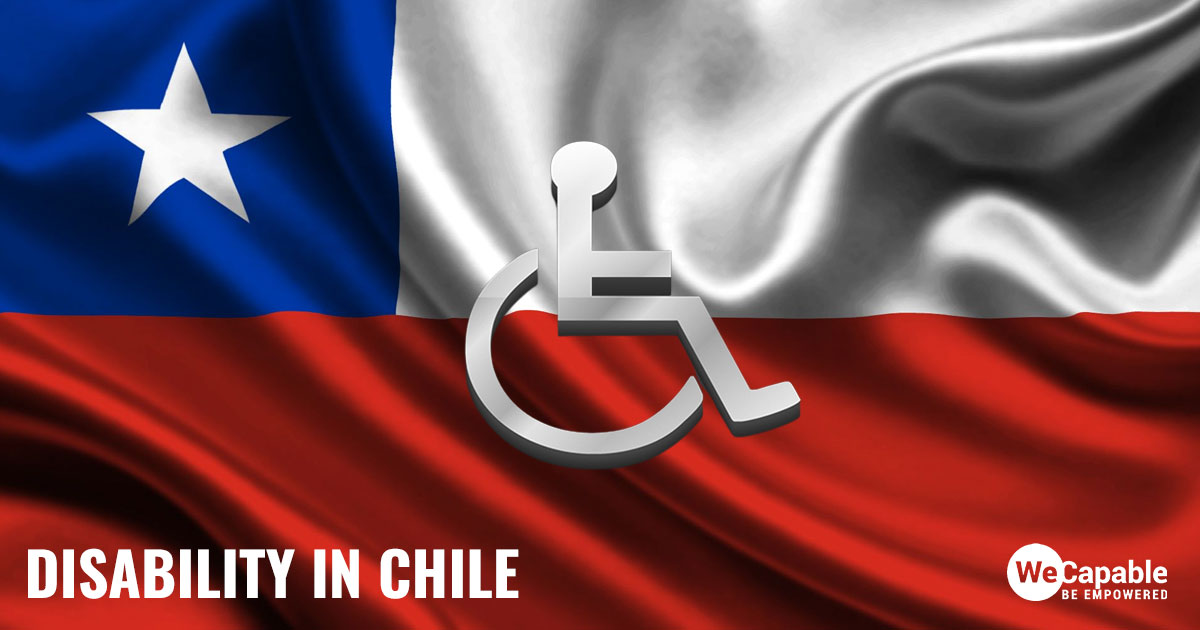Let us today take you to the Republic of Chile, the southernmost country of the world. But, we are not going to talk about the varieties of wines and beers for which the country is world-renowned. We will see how is it like to be in Chile when someone is inflicted with a disability. Let’s see!
Definition of Disability in Chile
Presently, the definition of disability valid in Chile comes from Law 20.422 which was enacted in 2010.
As per the definition given by the law, any person can be considered a person with a disability in Chile if the person finds that their full and active participation in the society, on an equal basis as others, is restricted or hindered by a temporary or permanent physical, mental or sensory impairment. The reason for mental impairment can be both psychological as well as intellectual. Further, a condition is considered a disability when the focus is on the ability to function and independent living rather than on treatment.
Disability Statistics of Chile
2,80,000 i.e. 16.7% of the Chilean population is inflicted with one or the other disability according to the National Disability Study conducted in 2015. About 8.3% of the population was reported to have a severe disability. Earlier surveys showed that females were slightly more likely to be disabled than males.
Though efforts are being made to create equality in society, different statistical studies show that people with disabilities in Chile face a high level of socioeconomic inequality. They are more likely to live in poverty as compared to their non-disabled counterparts. As per the 2015 study, only 39.3% of persons with disabilities had employment and around 32% of those employed persons with disabilities received lower wages.

Disability Laws and Legislation in Chile
1990 saw the beginning of the Social Model of Disability in Chile. The social model of disability focuses on creating an inclusive social structure that includes advocating inclusion and promoting equal rights for persons with disabilities.
In 1990, students with disabilities were included in the general classroom by Decree 490.
Law 19.284 i.e. the Social Integration of Persons with Disabilities was enacted in 1993/94 for the integration and inclusion of persons with disabilities in society. The law used the medical model of disability to define disability.
Chile signed the United Nations Convention on Rights of Persons with Disability in the year 2007 and further ratified it in 2008.
Law 19.284 subsequently got replaced by Law 20.422 in 2010. This established the Standards on Equal Opportunities and Inclusion of Persons with Disabilities and the National Service for Persons with Disabilities (SENADIS). The responsibilities allotted to SENADIS includes-
- Coordinating the activities and social services relating to persons with disabilities
- Offering job placement support to persons with disabilities
- Defending equal rights of persons with disabilities
Law 20.422 is currently the main disability law in Chile. The defined purposes of the law include-
- Ensuring the right to equal opportunities for people with disabilities
- Guaranteeing full social inclusion of persons with disabilities
- Eliminating all forms of discrimination based on disabilities
Law 20.255, passed in 2008, replaced the older assistance pension program with Basic Solidarity Pension of Invalidity. This is a social security pension that is given to elderly (over 65 years) with higher social vulnerabilities and to people between 18 to 65 years of age who have one or the other physical and mental disability (if they fulfill all other criteria).
Law 20.602, enacted in 2012, recognized Chilean Sign Language as an official language of the Republic of Chile. It was Law 20.422 that recognized sign language as the natural means of communication for the deaf community. The law, therefore, mandates the television broadcasters to provide the option for individuals to access subtitles and sign language interpretation of all the program being broadcasted.
Law 21.015, enacted in 2017, introduced some modifications in the existing Law 20.422. The employment of persons with disabilities was one of the main focuses of the modifications. Any company employing 100 or more employees in Chile must have a quota of 1% in their workforce for people with disabilities.
Laws Relating to Employment of Persons with Disabilities
- Law 20.422 along with Law 21.015 mandates that no discrimination shall be made against persons with disabilities in providing job opportunities, hiring or firing them or during their period of employment.
- Companies or Public organizations with 100 or more employees must have a 1% quota for persons with disabilities.
- Government agencies, state-owned companies and public institutions listed in the law are required to give preference to persons with disabilities under equal merits.
- Absolutely no discrimination can be made against persons with disabilities. The law further prohibits any organization from making any wage discrimination against persons with mental disabilities.
- Organizations with 10 or more employees with disabilities are required to provide reasonable accommodation at the workplace.
- An apprenticeship contract, regulated by the Labor Code, is a special kind of employment contract that can be entered only by people under 21 years of age. Persons with disabilities are free to enter such a contract regardless of their age.
Use the citation below to add this article to your bibliography
"Disability in Chile: Definition, Laws, Employment and Social Status." Wecapable.com. Web. June 14, 2025. <https://wecapable.com/disability-in-chile-definition-laws-employment-social-status/>
Wecapable.com, "Disability in Chile: Definition, Laws, Employment and Social Status." Accessed June 14, 2025. https://wecapable.com/disability-in-chile-definition-laws-employment-social-status/
"Disability in Chile: Definition, Laws, Employment and Social Status." (n.d.). Wecapable.com. Retrieved June 14, 2025 from https://wecapable.com/disability-in-chile-definition-laws-employment-social-status/

Leave a Reply